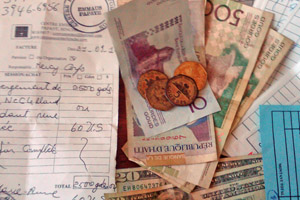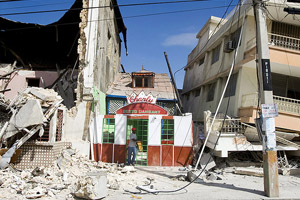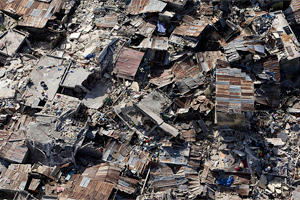
Mac McClelland
“I think this trip is going to be expensive,” I told my editors when I was getting ready to go to Haiti. Well, now I’m back and going through my notes—and a few receipts. Even though I’d had a hunch, I’d really had no idea.
Hotel room in Port-au-Prince: $125 a night, with no hot water, no generator (read: power only about 80 percent of the time). Gas: $5 a gallon. Thirty dollars for two weeks’ worth of phone service, local calls only. Avocado on white bread at a restaurant: $10. Fried chicken with rice and beans at a grubby roadside joint: same. Ditto a lunch dish with a bottle of water from a stand I’m pretty sure gave me a parasite.
The standard car-rental rate is $150 a day. If you need someone to drive it for you—and believe me, everyone does; Port-au-Prince traffic/navigation/rubble-dodging is not for the uninitiated, and even one of the UN soldiers chilling at my hotel crashed a truck after months of driving in-country—the price can be as high as $350. A day.
Once when we were walking through a hot, dusty displacement camp, my local driver/translator/partner in crime went to go buy a Coke. When he realized he didn’t have his wallet, he came back to me.
“I need a dollar.”
“U.S.? Are you kidding me?” There are stores in San Francisco that sell cheaper sodas.
People blame the prices on the fact that much of Haiti’s goods are imported, or that Haiti got screwed in free trade deals, or that there’ve been aid workers and UN soldiers and other interlopers with lots of needs and lots of dollars driving prices up for years or that Haitian poor people are so poor that they can’t buy stuff anyway so prices are aimed at the upper classes. Whatever the reason, I cut a lot of corners and wrangled a lot of free rides and cheap rates, but spent close to half as much in Haiti as I did in the Gulf covering the oil spill this summer. I was in Louisiana for four months. I was in Haiti for two weeks.
“This is a good place to be poor,” one of my new Haitian buddies (who happens to be rich) told me. As the prices were taxing even my American budget, I made a skeptical face. “Here, if you have nothing, you really have nothing,” he explained. “You really can’t afford to buy anything. But at least almost everyone else has nothing, too.”




